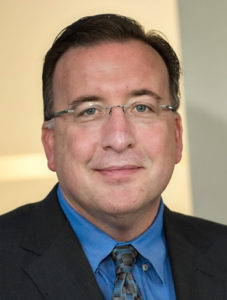Piedmont Healthcare is a private, not-for-profit organization serving nearly 2 million patients across Georgia. Today, more than 110 years since it was founded, Piedmont is known as a leading health system in cancer care, treatment of heart disease and organ transplantation, with seven hospitals, 19 urgent care centers, 94 physician practice locations and 1,615 Piedmont Clinic members.
 Joe Colonna
Joe Colonna
Vice president, supply chain and real estate, Piedmont Healthcare, Atlanta, Georgia
Since July 2008, Joe Colonna has served as vice president of supply chain. In 2016, real estate and construction were added to his responsibilities. Prior to Piedmont, he was a principle in Appleseed Healthcare, a supply chain and leadership consultancy. Colonna started his supply chain career with the United States Air Force, and has enjoyed a blend of healthcare experiences for over 30 years in different aspects of the healthcare supply chain, including roles in provider, consulting, distribution and group purchasing organizations. At Piedmont, he has worked closely with Piedmont’s executives, clinicians, business partners and one of the industry’s best supply chain teams to completely reorganize how Supply Chain is viewed by the organization. “I am proud to say that Supply Chain now plays a significant role in the strategic plans of the organization, and has been recognized nationally for the team’s role in supporting Piedmont’s mission,” he says.
At Piedmont, Colonna leads a team of professionals who are responsible for real estate, construction, corporate and local supply chain, biomedical and diagnostic imaging acquisition and maintenance, print services, and a value analysis process that focuses on all non-labor activities, including clinical and non-clinical devices, and which includes purchased services contracting. From a centralized service center, Colonna and his team provide low-unit-of-measure supply distribution, print services, biomedical and diagnostic imaging repair, courier services (third party) and IT central distribution for equipment. Piedmont has also centralized its front-office services, contracting, purchasing, materials management information and more.
JHC: What is the most challenging and/or rewarding supply-chain-related project in which you have been involved in the past 12-18 months?
Colonna: The changing role of and dependency on technology, mergers and acquisitions, and in general, a raising of the bar for our industry. The most challenging and rewarding thing for us as been the creation of an internal team that is focused both on the day-to-day needs of the organization as well as the more strategic elements of supporting Piedmont Healthcare’s mission and vision. We are professionals serving professionals, and for our team, that is not just a focus on saving money or stocking shelves (which is still very important), but also helping create business partnerships and relationships around quality, safety and service.
JHC: Please describe a project on which you look forward to working on in the next year.
Colonna: Piedmont Healthcare continues to grow both in geographical size and our services to the community. We are doing this while still remaining true to our CEO’s belief that we should always be good stewards of the funding we are given as a non-profit. This means that our team in both Supply Chain and Real Estate and Construction are often involved in helping grow the mission while remaining fiscally wise. I really enjoy that partnership and I am very proud of our role.
JHC: In what way(s) have you improved the way you approach your job or profession in the last 5-10 years?
Colonna: In recent years it has become apparent to many of us in the industry that supporting the mission of our facilities will be less about lower prices and more and more about lowering the total cost of ownership. This will mean creating greater efficiencies. These changes will require our team members and our business partners to embrace different and better ways of doing business. As always, this will be enabled by people, process and technology. None of this can happen if we do not improve the way we (as an industry) handle and respect the impact of data. In the past five to 10 years I have really grown to appreciate the impact of data on everything else we are trying to do in this industry. Not to the exclusion of the need for people or process, but instead, I think I have a better understanding of the rate-limiting impact of bad data on people and process improvement.
JHC: What do you need/want to do to become a better supply chain executive in the coming year(s)?
Colonna: Patience. The industry needs to be more agile and willing to change. Even change things that have been successful in the past. I am so proud of my industry and our team here at Piedmont Healthcare. I know what we are capable of doing, and sometimes I forget that we cannot do it all at once. I am very comfortable with change but change, even with the best of intent, must be balanced with patience … I am working on it.
